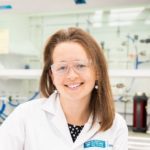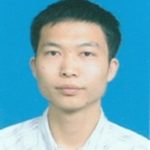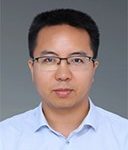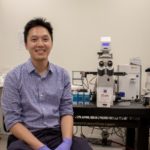Welcome to our Emerging Investigator Series 2021. This series showcases some of the very best work from chemists in the early stages of their independent careers. In keeping with the theme of RSC Advances as a cross-cutting chemistry journal, in this inaugural issue with the help of our Series Editor Professor James Batteas, we have 23 papers spanning the breadth of chemistry on topics ranging from the development and application of analytical tools and devices for chemical analysis, to the design and synthesis of bioactive materials for disease treatments, to catalysis and synthesis of new materials. You can read all about the contributions in this accompanying Editorial, prepared by the 2021 Series Editor James Batteas.
You can read below the biographies of some of the brilliant authors who have been published in the 2021 collection:
Thiago Regis Longo Cesar da Paixão
Enhanced performance of pencil-drawn paper-based electrodes by laser-scribing treatment
Thiago Regis Longo Cesar da Paixão received a B.Sc. from the Institute of Chemistry of the University of São Paulo in 2001 and became a graduate student at the same institution, where he received his M.Sc. (2004) and Ph.D. (2007). For a year (2008/2009), he was a postdoctoral fellow at the same University. Following his postdoctoral fellowship, he was appointed as an Assistant Professor at the University Federal of ABC, where he stayed for two years. In 2011, he was hired as an assistant professor at the University of São Paulo and promoted to Associate Professor in 2016. At the beginning of 2018, he was nominated as an affiliate member of the Brazilian Academy of Science as a promising young researcher. His fields of interest include chemical sensors, paper-based devices, and electronic tongues aiming at forensic and clinical applications.
Selective release of a potent anticancer agent from a supramolecular hydrogel using green light
Zbigniew Pianowski received his PhD in chemistry in 2008 under the supervision of Prof. Nicolas Winssinger at the ISIS ULP Strasbourg, France, investigating peptide nucleic acids (PNA) – functional oligonucleotide analogues – for templated reactions and catalytic RNA sensing. Then, he joined the group of Prof. Donald Hilvert at the ETH Zürich, Switzerland, as a Marie-Curie postdoctoral fellow. There, he worked in the area of protein engineering, like de novo enzyme design and engineering of protein capsids. Since 2014 he has been an independent group leader at the Karlsruhe Institute of Technology (KIT), Germany, and served as a deputy professor of organic chemistry at the University of Heidelberg (2017-2019). His current research interests are focused on applications of molecular photoswitches in smart materials and biological systems. Within this area, his group intensively explores photochromic supramolecular hydrogels reversibly disassembled with light, their use for light-controlled drug release, and other photopharmacology applications of photochromic cyclic dipeptides.
Prof. Trader obtained her Ph.D. under the mentorship of Erin E. Carlson while at Indiana University in 2013. She then went on to do a NIH-funded postdoc with Prof. Thomas Kodadek, where she was introduced to proteasome-related research. She began her independent career at Purdue University in the Department of Medicinal Chemistry and Molecular Pharmacology in 2016. Her lab is focused on furthering the understanding of how small molecules can be used to perturb the activity of the proteasome. Her lab has developed activity probes for both the standard proteasome and immunoproteasome, and is actively applying these probes to discover proteasome inhibitors and stimulators.
Dr. Beemelmanns studied Chemistry at the RWTH Aachen. She then went to Japan for a one year research stay in the group of Prof. Sodeoka at RIKEN. Back in Germany she worked at the FU Berlin with Prof. Reißig and received her PhD in Organic Chemistry. She then worked another six month in Japan at the University of Tokyo under the supervision of Prof K. Suzuki and joined shortly afterwards the group of Prof. Clardy at Harvard Medical School (Boston) in 2011. End of 2013, she received an offer from the Hans-Knöll Institute (HKI), where she established the Leibniz Junior Research Group in the field of Natural Products Chemistry and Chemical Biology. In 2021 she accepted a call from the Leipzig University for a Professorship Biochemistry of Microbial Physiology. Her research combines different aspects of chemical ecology and organic and natural product chemistry and aims to chemically and functionally characterize microbial signaling and defense molecules in different symbiotic model systems. By analyzing coevolved microbial interactions, unprecedented chemical core structures with potential pharmaceutical application are likely to appear.
Abisola Egbedina is a PhD student in Industrial Chemistry at the University of Ibadan, Nigeria under the supervision of Professor Kayode Adebowale and Professor Bamidele Olu-Owolabi. She earned her bachelor’s degree in Industrial Chemistry from Bowen University, Iwo, Nigeria (2009) and her master’s degree in Industrial Chemistry from the University of Ibadan (2012). She received the 2017 Commonwealth Science Conference follow-on grant from the Royal Society of Chemistry in 2018 to conduct research at the University of Toronto, Canada under the supervision of Professor Ya-Huei (Cathy) Chin.
Her research interests lie in the synthesis of low-cost and environmentally benign materials for applications in wastewater treatment. Specifically, she focuses on tuning the surface properties of these materials for optimum selectivity and efficiency. Her current research focuses on the synthesis of carbon materials from biomass for the removal of pharmaceuticals and other emerging contaminants from water. She has a number of peer-reviewed publications in international journals. She has also presented some of her research findings at various local and international conferences.
Abisola Egbedina was appointed as an Assistant Lecturer in the Department of Chemistry, University of Ibadan in November 2016, and is currently a Lecturer II. Besides teaching and carrying out research, Abisola loves reading novels, watching movies, swimming and dancing.
Dr. Kishor Sarkar was awarded PhD in Polymer Science and Technology from University of Calcutta, India in August 2014. In 2016, he has joined as Assistant Professor in the Department of Polymer Science and Technology, University of Calcutta in June 2016. Before joining here, he worked as postdoctoral fellow in the Department of Pharmaceutical Sciences, University of Pittsburgh, USA (May 2015-April 2016). He was awarded Dr. D.S. Kothari Postdoctoral Fellowship in India and carried out his postdoctoral work under Prof. Giridhar Madras, Department of Chemical Engineering and Dr. Kaushik Chatterjee, Dept. Of Materials Engineering, IISc, Bangalore, India from Nov. 2013 to March 2015. Dr. Sarkar has broad background in Polymer Chemistry with specific training and expertise on the development of polymeric non-viral vectors for gene therapy application. After joining as Assistant Professor, Dr. Sarkar received Early Career Research Award from SERB, Govt. of India in March 2017. Presently, the main research area of Dr. Sarkar focuses on the development of efficient polymeric vector for drug delivery or gene therapy application and synthesis of novel biopolymers from recycled plastic wastes for Tissue Engineering applications.
On the key role of aluminium and other heteroatoms during interzeolite conversion synthesis
Prof. Michiel Dusselier obtained his Ph.D. degree in Bioscience Engineering (Catalytic Technology, 2013) at KU Leuven, Belgium, with Bert Sels, inventing new catalytic routes for bioplastics synthesis. In 2014–15, he did postdoctoral work with Mark Davis at Caltech, studying the synthesis of zeolites and methanol-to-olefins. In 2017, he accepted a tenure track professorship at KU Leuven and co-founded the new Center for Sustainable Catalysis and Engineering (CSCE) in 2019. He is focusing on zeolite synthesis methods, reactor design, functional biodegradable plastics and heterogeneous catalysis (CO2 activation). In particular, he is enthusiastic about elaborate synthesis-structure-activity relations and bottom-up catalyst design. He has (co)authored over 60 peer-reviewed papers and 7 patents, of which one transferred to industry. He is the holder of an ERC starting Grant (2020) called Z-EURECA, studying unusual reactors for zeolite synhtesis. In 2021, he received the alumni award in applied sciences of the Belgian American Educational Foundation.
The photophysical properties of naphthalene bridged disilanes
Dr Erin Leitao obtained her BSc degree in Chemistry from the University of Victoria (BC, Canada) in 2006. Her final project, with Prof Scott McIndoe, involved the synthesis of electrospray active distannoxane catalysts. Erin’s PhD degree was awarded from the University of Calgary (Alberta, Canada) in 2011 and was supervised by Prof Warren Piers. Her research project investigated the decomposition and re-design of an olefin metathesis catalyst. Erin was then a Marie Skłodowska-Curie Postdoctoral Research Fellow with Prof Ian Manners at the University of Bristol (UK) where she transitioned into researching catalysis of main-group compounds as well as polymer self-assembly. Erin has been at the University of Auckland for six years and in 2016 she was the NZ recipient of the L-Oréal-UNESCO for Women in Science fellowship. Members of the Leitao lab are working towards the synthesis of new main-group molecules and materials using catalysis.
Chandra Sekhar Tiwary is a professor at Department of metallurgical and materials engineering, at Indian Institute of Technology Kharagpur, Kharagpur India. After receiving his Ph.D from Indian Institute of Science Bangalore India. He worked as postdoc at Rice University, Houston, USA. His group works on 3D printing, 2D materials, nanomaterials, development of new alloys and its applications in environment, energy, electronics and catalysis etc. Based on his contributions, all three Academies of India (Indian National Science Academy, National Science Academy, India and Indian National Academy of Engineers) awarded him the Young Scientist Awards. Apart from this, the Ministry of Steel, India, has awarded him the Young Metallurgist of the year 2020 for his contributions to metal research. Electron microscopy society of India has recognized his contribution to electron microscopy and awarded him the Excellent Microscopist of 2020. He has been also awarded the Alain Reza Yavari Young/Junior Scientist Award -International Society of ISMANAM and many more. For carrying out cutting-edge research in India, the Department of Science and Technology, India, has awarded Prof. Tiwary the Ramanujan Fellowship in 2018.
Phase-dependent dielectric properties and proton conduction of neopentyl glycol
Dr. Jiangshui Luo has been a Professor in College of Materials Science and Engineering, Sichuan University in China since 2020, where he is the Head of the team of Electrolytes and Phase Change Materials. He has been appointed by Sichuan province as a distinguished expert since 2021. He has also been appointed by KU Leuven in Belgium as a visiting professor.
He received his bachelor’s and master’s degrees from Xiamen University and Dalian Institute of Chemical Physics, Chinese Academy of Sciences, respectively. From 2008 and 2011, he worked as a project researcher on high temperature electrolytes in EWE Research Center for Energy Technology in Germany. He completed his PhD study on protic salt electrolytes for fuel cells in KU Leuven within 2 years in November 2012.
His research interest includes electrolytes, phase change materials, electrocatalysts, heat transfer fluids, solid-state refrigeration, isotope effects and scientometrics. So far, he has published 52 journal papers and holds 10 patents. He proposed and demonstrated protic organic ionic plastic crystals (POIPCs) as a novel type of proton conductors for fuel cells. He has been the PI of 7 national projects and received several governmental awards. He is an Editorial Board Member of Journal of Ionic Liquids.
Photoactive antimicrobial coating based on a PEDOT-fullerene C60 polymeric dyad
Daniel A. Heredia is an Adjunct Researcher of CONICET at National University of Río Cuarto (UNRC). He graduated in 2009 with a BSc and he received his PhD degree in material science and electrochemistry in 2014 from UNRC. He obtained a postdoctoral research fellowship at the Institute of Chemistry of Rosario, where he did research into the total synthesis of structurally relevant natural products. He was visiting researcher at Complutense University of Madrid, at Helmholtz-Zentrum Berlin für Materialien und Energie GmbH and at Arizona State University. His interests are wide, ranging from organic synthesis to the development of new materials and their photophysical characterization. His current research activities focus on the synthesis of organic materials to apply in photodynamic inactivation and optoelectronic devices.
Frank Hahn
Frank studied Chemistry at the Universities of Karlsruhe, Paris VI and Bonn and finished his PhD on solid phase synthesis and biological evaluation of polyamines in 2008. He then moved to the University of Cambridge (UK) to study polyketide biosynthetic pathways with Prof. Peter F. Leadlay. In 2011, he returned to Germany to start his independent career at the Leibniz University Hannover, where he became leader of a DFG-funded Emmy Noether Research Group in 2013. In 2016, he moved to his current position as a Professor of Organic Chemistry at the University of Bayreuth. His research interests are in the fields of natural product synthesis and biosynthesis as well as the biotechnological exploitation of the microbial secondary metabolism.
David J. Lewis (DJL, h = 31) is Deputy Head of Department, Head of Research & Reader in Materials Chemistry in the Department of Materials at The University of Manchester, UK. DJL leads a research group actively researching soft processing and applications of nanostructured and low-dimensional materials broadly related to energy generation. DJL’s research has led to over 100 publications and he has been the recipient of funding from EPSRC and The Royal Society as well as a number of industrially-sponsored grants. In 2021 he was elected by Members and Fellows to serve on the RSC Materials Chemistry Division council for 3 years.
Binju Wang obtained his PhD in 2012 from Xiamen University in China. After two periods of post-doctoral research at the Hebrew University of Jerusalem, Israel (with Prof. Sason Shaik) and Universitat de Barcelona, Spain (with Prof. Carme Rovira), he joined Xiamen University in 2018 as a full professor. His current research interest focuses on the use of multiscale modeling to decipher the catalytic mechanisms of metalloenzymes, including O2 and H2O2 activations, electronic state and spin-state reactivities, protein environment effects, as well as the rational design of metalloenzymes for biocatalysis. Professor Wang has published over 50 peer reviewed publications.
An ultrafast enzyme-free acoustic technique for detaching adhered cells in microchannels
Dr. Scott Tsai is the Director of the Graduate Program in Biomedical Engineering, and an Associate Professor in the Department of Mechanical and Industrial Engineering at Toronto Metropolitan University (formerly Ryerson University). His undergraduate training in Mechanical Engineering is from the University of Toronto, and his masters and PhD degrees in Engineering Sciences are from Harvard University. Dr. Tsai’s laboratory specializes in droplet and bubble microfluidics. His group also collaborates actively with hospital researchers to implement these technologies in medical applications related to kidney disease and prostate cancer. Dr. Tsai is a recipient of the United States’ Fulbright Visiting Research Chair Award, Government of Ontario’s Early Researcher Award, and Toronto Metropolitan University’s Deans’ Teaching Award.
Daniel Globisch is an Associate Professor in Analytical Chemistry at Uppsala University. He studied Chemistry at the Technical University of Kaiserslautern (Germany) and the University of Southern Denmark, Odense (Denmark). He received his Ph.D. from the Ludwig-Maximilians-University Munich (Germany) with Professor Thomas Carell in March 2011 and joined the laboratory of Professor Kim D. Janda at The Scripps Research Institute (CA, USA) for his postdoctoral studies for 4.5 years. He started his independent career in September 2015 at Uppsala University (Sweden) after recruitment as a Science For Life Laboratory Fellow. He was appointed as Associate Professor in 2017 and joined the Department of Chemistry – BMC after securing a tenured position in December 2020. Daniel has been elected as a board member of the Nordic Metabolomics Society for two terms and as an Editorial Board Member for the metabolomics society journal Metabolites. The interdisciplinary nature of his research projects is focused on the elucidation of the metabolic interaction between the gut microbiota and their human host. Towards this goal, his laboratory develops new Chemical Biology tools to extend the scope of metabolomics research for the selective discovery of unknown biomarkers and bioactive metabolites.
Tangxin Xiao was born in China in 1987. He obtained his B.Sc. degree in chemistry from Hubei Normal University in 2009. Then he joined the laboratory of Prof. Leyong Wang at Nanjing University and got his Ph.D. in supramolecular chemistry in 2014. After postdoctoral research on fine chemicals at Zhejiang University-NHU Company United R&D Center, he joined Changzhou University in 2017, and was promoted to Associate Professor in 2020. Between March 2021 and June 2022, he worked as a visiting scholar in Prof. Oren Scherman group at University of Cambridge. His current research interests concern the supramolecular chemistry and luminescent materials. He has co-authored more than 50 publications with a total citation of more than 2700 times and his H-index is 23.
Influence of water-soluble pillararene hosts on Kemp elimination
Xiao-Yu Hu obtained her Ph.D. in pharmaceutical chemistry from the Chengdu Institute of Biology (CAS) in 2011. After postdoctoral research with Prof. Leyong Wang, she joined Nanjing University as an associate research professor in 2013. In 2016, she joined University of Duisburg-Essen as a senior AvH Fellow (“The Humboldt Fellowship for Experienced Researcher”) working with Prof. Carsten Schmuck. Since 2018, she has been appointed as the Full Professor of Organic Chemistry at Nanjing University of Aeronautics and Astronautics. Her current research interests are focused on supramolecular self-assembly and functional supramolecular materials. She is currently the associate editor of Frontiers in Chemistry, and an editorial board member of Chinese Chemical Letters, Green Synthesis & Catalysis, and Molecules.
She has authored and coauthored over 100 research publications, including Nat. Commun., J. Am. Chem. Soc., Angew. Chem. Int. Ed., Acc. Chem. Res., CCS Chem. and so on. Moreover, has received many grants and awards, including the National Natural Science Foundation of China, the Natural Science Foundation of Jiangsu Province for Outstanding Young Scholar, the Humboldt Fellowship for Experienced Researcher, the Science and Technology Award of Jiangsu Province, the National New Star Award in Supramolecular Chemistry of Aromatic Macrocycles, and the Teaching and Research Achievement Award of Jiangsu Province.
We would like to give a huge thank you to Series Editor James Batteas, Associate Editors and to all our reviewers at RSC Advances for their ongoing support and contribution, helping us to bring together such a fantastic collection of articles.
Looking forward: Emerging Investigator Series 2022!
We are pleased to announce the Series Editors of the next Emerging Investigator series of 2022: Fabienne Dumoulin and Shirley Nakagaki, and we can’t wait to see what the next early career investigators have been working on in Chemistry! Selection for the Emerging Investigators series comes in part from the recommendations of our Editorial Board as well as our Associate Editors. Authors can also self-nominate for participation and review by our Associate Editors for the journal, articles can be submitted to the series at any time and will be accepted and published throughout the year.
If you would like to be involved in our up coming series, please look at our webpage here for more information or submit now!
For any questions do not hesitate to contact us at advances-rsc@rsc.org
 Submit to RSC Advances today! Check out our author guidelines for information on our article types or find out more about the advantages of publishing in a Royal Society of Chemistry journal.
Submit to RSC Advances today! Check out our author guidelines for information on our article types or find out more about the advantages of publishing in a Royal Society of Chemistry journal.
Keep up to date with our latest Popular Advances, Reviews, Collections & more by following us on Twitter. You can also keep informed by signing up to our E-Alerts.




























